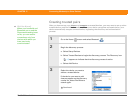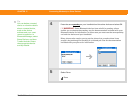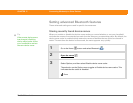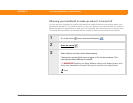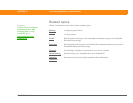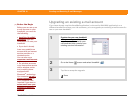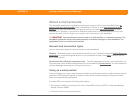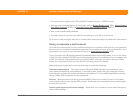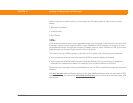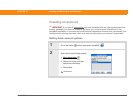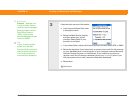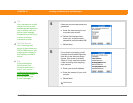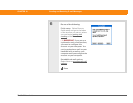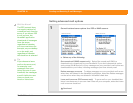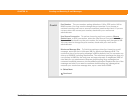
Zire™ 72 Handheld 301
CHAPTER 18 Sending and Receiving E-mail Messages
• The name of the outgoing mail (Simple Mail Transfer Protocol, or SMTP) server
• Your account’s security feature (if it has one), such as Secure Socket
Layer (SSL), Authenticated
Post Office Protocol (APOP), or Extended Simple Mail Transfer Protocol (ESMTP)
• Your e-mail address and password
• The login script (if any) that you need for connecting to your ISP or mail server
Go to your e-mail provider’s web site or contact their customer support to obtain this information.
Using a corporate e-mail account
If you want to access e-mail on your handheld using your corporate e-mail account, you create this
account on your handheld in exactly the same way as any other account, with one exception: for a
corporate e-mail account, you may need to set up a virtual private network
(VPN).
If your company has a Bluetooth network located behind the corporate firewall, or if you are using
an 802.11b (also called Wi-Fi) SDIO card (sold separately) in your handheld and your company has
an 802.11b network located behind the corporate firewall, you may not need to set up a VPN to
access your corporate e-mail account. See the following section for details.
When setting up a corporate e-mail account, keep in mind the following:
Username and password This might be your Windows 2000 username and password, your
Lotus Notes ID username and password, or something else. Check with your company’s server
administrator to obtain the correct username and password. The VersaMail application provides
strong 128-bit AES encryption for your password.
Protocol Most corporate mail servers use the IMAP protocol for retrieving mail. In rare cases,
your company server may use the POP protocol. Check with your company’s server administrator
to verify the protocol.
Incoming and outgoing mail server settings Check with your company’s server administrator to
obtain these settings.



